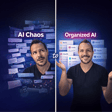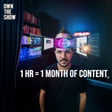Become a Creator today!Start creating today - Share your story with the world!
Start for free
00:00:00
00:00:01

AI in Action: A Strategy for Enhanced Buyer Personas w/Ryan Paul Gibson
In this episode of the AI-Driven Marketer, Dan Sanchez talks with Ryan Paul Gibson about the groundbreaking concept of 'Living Buyer Personas' through the integration of AI with Slack and Teams. Ryan shares his journey from the inception of this idea to its execution, explaining the technicalities, challenges, and immense potential of using AI to access and utilize deep buyer persona information instantly. Discover how this innovative approach can transform your marketing and sales strategies by making detailed customer insights readily accessible in your daily workflow.
Episode Timestamps:
- 00:00 - Introduction to Ryan Paul Gibson and the concept of 'Living Buyer Personas'
- 01:20 - How 'Living Buyer Personas' originated and the motivation behind them
- 05:00 - The technical integration of AI with Slack/Teams for real-time data queries
- 10:57 - Practical applications and real-world use cases of 'Living Buyer Personas'
- 17:29 - Discussing the dynamic and static nature of data within AI integrations
- 23:53 - Future visions for AI integrations and enhancing workflow efficiency
- 27:09 - The importance of creating actionable and enriched buyer personas
- 33:07 - Comparing custom GPTs: Narrow vs. broad applications in marketing
- 37:26 - The potential for marketers to leverage 'Living Buyer Personas'
- 41:26 - Closing thoughts and where to learn more about Ryan's work
Transcript
Introduction and Mission
00:00:00
Speaker
Welcome back to the micro skills podcast. I'm Dan Sanchez, and we're on a mission to empower marketers with what's going on with AI to make the most out of it today. I'm thrilled to be talking to Ryan Gibson about something he's created, something he's experimenting with, uh, called living buyer personas.
The Experimental Phase with AI
00:00:19
Speaker
So Ryan, for starters, just welcome to the show. Yeah. Thank you for having me. I'm, I'm honored. Cause it's.
00:00:25
Speaker
This is a new territory for me. So I'm, I'm almost like anxious speaking about it. I know. Well, it's like I said, before we started recording, it's new territory for everybody. Everybody's pushing the envelope. Everybody's an experimental stage. I wouldn't say anybody's got like the inbound marketing, like method of AI yet. No one's figured it out. Everybody's, everybody's experimenting right now and trying to see what they think they can get out of it. There's some tried and true plays out there, you know, like, Oh, I can use AI to turn my block.
00:00:54
Speaker
my podcast transcript into content. Great. Like, okay, everybody's kind of figured that out. Like we got that, that one thing figured out, but that's not a strategy. That's a very small tactic that we were already doing, you know? So I'm excited to look at some of these, some fringe cases of where people are plugging things together and making, making some useful stuff with it. And I think that's what you have going on here.
Integrating AI with Buyer Personas
00:01:18
Speaker
So let's, let's start with explaining like the concept of living by our personas and kind of how it originated for you.
00:01:24
Speaker
So to explain what it is, just in Frank terms, I've integrated very deep first party data into just the backend of OpenAPI's assistance. Because there's the chat GPT that you can build, your custom chat GPTs, and there's
00:01:44
Speaker
the open AI section where you can have API keys talk to each other, right? So what I've done is I just uploaded a data set into an assistant and I connected it to Slack. And the reason I wanted to do that is I wanted to be able to query my own data in Slack, and there's a rationale for that. So how did that come up? How did this come to be? There are sort of two driving forces, and this might take me a bit to get through, Dan, so I hope this is not like a rambling answer. The first one was
00:02:15
Speaker
You know, when I worked in-house, one of the challenges, and you've worked in-house in companies before, one of the key friction points to your day-to-day is just trying to find stuff, like trying to find information that you need to make decisions in that moment, right? And they're spread out all over the place. Sometimes they're in a Drive folder or an online server, maybe they're in some type of Wiki, like a Notion or a Confluence,
00:02:43
Speaker
It's just lack thread buried somewhere, right? It felt like it was an ongoing thing to talk about creating a single source of truth because of that problem. Like it was a constant thing for years. Oh, it is. Yeah. And that's even happened in meetings. Like you're in meetings and you're asking questions and you're like trying to find information on the fly. So I had this thought around like, well, what if I could just have the information come to me?
00:03:07
Speaker
like instantly, that I need to find to make that decision in the moment. And then the second sort of guiding thought in my brain was I work as a consultant now, I have for the last few years, the output of my work is deep
00:03:23
Speaker
like qualitative first party analysis of like buying journeys and how B2B companies make decisions on like vendors and how they buy solutions. And it's like a lot, like if you've seen one of my reports, it's a lot. And I try to whittle it down to executive summaries, any known action points for people. But like most consultants, a lot of what I do ends up living in a folder somewhere.
00:03:45
Speaker
Right. And that's not new. That's happened for decades. I've been a B2B 21 years and consultants come in with good work. And sometimes it just gets lost to time. So I was like, I didn't like that. I didn't like that. It just sits there and doesn't necessarily get socialized.
Technical Setup and Data Querying
00:04:00
Speaker
So I was thinking, how can I get this data into the, like the daily workflow of people? So that was, I started looking around for options around what I can use to do that. And I had this moment of clarity because I still work
00:04:14
Speaker
as a fractional part time for a software company here in Canada. So I'm in their Slack all day, just seeing what's going on, chiming in the conversations. And I was like, what if I could just pull the information here?
00:04:26
Speaker
And that's when I started looking for the integration and that's sort of what led me to live in buyer persona. So now what it is, is it's all my, all the data sets that I gather for first party data. It's in an assistant through open API and I can go into Slack and just query the data in real time. So I'll stop there, but that was sort of like, that was the progression to how I got to where I am. So tell me a little bit about the, how it's all integrated together.
00:04:52
Speaker
Like when you're, so you're able, you're, you're using Slack as the interface to call the information. Where is it getting called from? Yeah. So this is where my, like, I'm still in the journey of trying to understand how to format the data in a good way. But what's happening is if anyone has used the build their own GPT, which I have, uh, right. That's how I started. I just used the, the regular build your own GPT. I saw a call a for.
00:05:21
Speaker
Actually, one of my cousins who was as PR, he'd built his own back in October when it first got launched in November, I think if you know the time was burn, I would. And he'd built something like most of us have done to build their own sort of internal database that they use. I was like, that was great. So I dumped all my information from my own work into there because I have an online guide.
00:05:44
Speaker
And I was like, it'd be really interesting to build that for my own clients who use the online interview guide. So I started there. And how you build the data sets into that, the basic 101 way is just PDFs. So you're downloading all the information to PDF, or sorry, into a document. You're downloading the PDF and you're uploading that PDF back into chat GPT. So you can do the same thing on the OpenAI Assistant side.
00:06:08
Speaker
where you can upload the exact same PDFs. And if you look at the two operating systems, the chat GPT operating system and the OpenAI operating system, they're almost identical, right? There's more bells and whistles on that side, on the OpenAI side. So I was like, okay, well, how do I connect these two? So I just started Googling videos, like YouTube videos. Same way you would like, how do I fix my broken sync? How do I connect these two things?
00:06:35
Speaker
So I found a few ways to do that. And there's, it's either you can do it through code scripts, which I found a medium blog or somebody who did that. So you grab the API key from Slack, and you have to create like
00:06:52
Speaker
your own sort of app through the API key. And then you create, you grab the API key through, um, open a open AI, and you can spin up, spin up a script to this, haven't talked to each other, but that's not me. Like I'm not, I'm not a coder. I don't know how to use any type of coding language. I I'm not use case where I like no code stuff. So I used as Zapier. There's other ones you can use. There's one I found called plug bear and
00:07:19
Speaker
I'm sure that all the other integration softwares like Make, I know there's other ones, they're probably going to have their own version of this. So what I've done is you just add the API keys into Zapier's
00:07:33
Speaker
workflow, and then they start talking to each other. And it's pretty quick. It looks like it depends on if they're throttling or not, like the usage that day, because you buy credits, and then you do an API call, and then the machines talk to each other.
00:07:50
Speaker
And the fastest scene had done is like three seconds for me to query data and get it back. Last night I was testing it before we talked. So I want to see what was happening. It was taking about 10 to 12 seconds, but even then that's still not too bad. I noticed it was slow last night too. For some reason, I'm like, Oh, lots of people using chat GPT right now because it's taking forever for it to knock out an answer. Yeah. Yeah. So I hope that answered the question. I might've missed something, but that's really the basics of how you're starting with Slack. It's going through Zapier.
00:08:18
Speaker
Calling and then calling chat GPTs chat GPTs AI through yeah through the API Correct. It's kind of a three-part piece here correct So where are you uploading data into the back end of open AI so I can oh you can store it back there Yes, I thought it was just a place where you plugged into their API. I didn't realize you could like just
00:08:41
Speaker
So are you uploading PDFs in the backend? Is it a custom GPT or is it in the, in the, in the API sector? It's in the API developer part. Interesting. So if you go to, so when I just open, open API now and there's two, there's two, it's like two zero to venture, right? So they have chat GPT box. Do you want to build that? Or do you want to go to the, the backend API section? And that's the part that often for people like me who are not technical, like this intimidating, it still is to be honest.
00:09:09
Speaker
But that is where there's a little robot in their sidebar navigation says assistance. And that is, it's basically identical to building your own GPT, like private GPT that people have been doing. So you can just go up in the sidebar and it says create a little plus sign. And you look at it, it's almost identical to how you do to GPT. There's a few more elements that you need to sort of understand.
00:09:35
Speaker
you know, and you have to, based on what part of the
00:09:40
Speaker
the model you pick, for people who aren't familiar, there's different GPT models now that you can access. There's four turbo, just four, 3.5 turbo, 16K. There's all these variations. Yeah, and they're different costs too, right? Yeah. And some of them won't retrieve data from static documents that I've uploaded. Some will. So you just have to make sure you have the right one added.
Practical Applications and AI in Marketing Strategies
00:10:02
Speaker
There's a section in those assistants called retrieval.
00:10:06
Speaker
And I'm just reading it right now, retrieval enables the assistant with knowledge from your files. Once the file is uploaded, you can retrieve from the content. That has to be checkboxed. And then once you upload the PDFs, you pretty much set the first part of it.
00:10:19
Speaker
And then you have to set up all the infrastructure. But that's no different than what I was doing with my own data set in my personal GPT, where I'm just uploading PDFs, right? What I've heard though, and I don't know if this is true, Dan, so this would be something for you to sort of investigate as you move along. I was talking to a colleague this week and he said his understanding is that the API is actually has less hallucinations.
00:10:42
Speaker
Uh, is more accurate and is faster than the cheap PT side of things. I don't know if that's true, but I'm hearing that. So it sounds like it would be true just because a developer can dial it in. Like on the cheap GPT side, you don't get to pick which GPT use. I mean, you do, you get to pick between 3.5 and four. Great. But there's actually all these versions of it. And there's also another tool I've noticed when you're playing going through the API.
00:11:10
Speaker
There's like a little slider. I forgot what they call it, but like, do you want it to be more exact or do you want to give it more freedom and giving you an answer back? Okay. I miss, I haven't seen that one. It's good to know.
00:11:20
Speaker
Because I've used some tools where I can like, for my own CRM, there's like a, oh, send, send information to GPT and get it in for, get it back and put it into a field. And there's this like little slider that I've seen on a few tools now where it's like, how, how do you want your data back? Do you want it to be stay really strict and concise or do you want to give it more freedom? Yeah. So that's kind of a thing that I know exists back there. Okay.
00:11:46
Speaker
Yeah, I'm learning too. Yeah, I'm learning too. So it's good. I'll start looking for it now. Yeah. We're probably both in the same area where I'm like just behind you. Cause I've thought about going back there and I just haven't gone back to the API yet, but I'm looking at tools that do. And I've also looked at the no code tools cause I'm starting to like,
00:12:02
Speaker
think like, how do I build an interface where people can work through this? Yeah, absolutely. Okay, so that's interesting. Essentially, it gives you a way for multiple people to query from Slack, the data and pull from it. Are you writing instructions to on how that data needs to come back? Not yet. That's sort of the next step for me. And just kind of using it as data retrieval. Yeah.
00:12:27
Speaker
For now, I can talk about how I'm using it more specifically, but just to one thing you said, in Slack, I haven't done one with Teams. You can do the same thing with Teams, Microsoft Teams, because the amount of people using Teams, I know if anyone's looked at the user base, but Teams is dramatically more than, there's more users in Slack just by the nature of how many people use Microsoft through the working world.
00:12:53
Speaker
You can do both, but there's still limitations to what I'm doing or it's just one channel in Slack. So it's not like I can just call a bot in any channel.
00:13:05
Speaker
But Zapier has built, there is a way to do that. I don't know how to do that. Technically, Zapier has built an integration where you can build that. I think it's like $20 a month. It's a chat bot. And that bot lives agnostic to any channel. So I can go into any channel. I can query the bot with whatever I want to know.
00:13:24
Speaker
and it'll spit out the information to that query within that channel. So that's really interesting. The thing is it just costs money, right? So that's the trade-off we're doing here is like build your own versus buy off the shelf. So your question was, you had a question there and I missed it. I'm sorry. Can we go back to your question? Do you recall what it was? How are you using this then? Yeah.
00:13:45
Speaker
One of the reasons I wanted to play around with is how can I get access information in real time to actually address things that are happening in the business. Some of the use cases we've seen, we've talked about it, is someone has a transcript they're trying to
00:14:03
Speaker
I turned to a blog post and that's fine. What I care more about is how can I ideate on the fly and brainstorm and address situations that come up in a company within the operating system that we use? Let me give an example.
00:14:19
Speaker
Sales has objections all the time. If we're working in a B2B environment and sales comes up with objections and maybe something comes up where they're not sure how to handle it. And you would see the chatter in a sales team. This is the question coming in. This is how I've done it in the past and so on, which is fine. What I started doing was I started pinging my chatbot about objections around, say, interviewing customers. One objection I get in my work is, well, the C-suite doesn't want to invest in customer research.
00:14:47
Speaker
Right. So I ping my chat bot, I'm getting this objection. Can you form related response to give me some ideas of how I battled this objection? And it spits out information on how to do that. You know, or you can, how, what, what I really do was here's the buyer, here's their business, here's their business model. Here's the problems you're telling me. How can I write an objection to that? Great. Other things I've been doing is, you know, what's the top pain point for this customer? I did a research report for a company.
00:15:16
Speaker
that want to expand into long haul trucking with their software. So that's one of the data sets I loaded up into chat GPT. And in Slack, I asked it, okay, what's the top pane? So give me the top pane that it faces. And it was, you know, the top pane was securing loads and loads is like how to actually find new load, like cargo loads, transport.
00:15:38
Speaker
and securing me and just like, how do I actually find one to buy and get money from a contract? So I was like, great, write me a blog outline that can talk to that and give me some ideas and pull customer quotes, quotes from the interviews that I can put into the blog and it gave me an outline gave me the blog. So like interesting, like that, those are real use cases. And now the team
00:15:57
Speaker
that's working in Slack can see that and say, that's interesting. How can we use that? You know, create me a four LinkedIn posts that might talk to this, or we have a campaign coming up. How can I structure a campaign? Or on the reverse side, I took copy from some of the technology stacks that they were talking about and some of the tools they use. And I took their H1H2s and ran it against the research in Slack to say, does this fit with the value proposition
00:16:22
Speaker
and the pain points of these buyers. It would give me some guidance on whether that copy makes sense. It's just really interesting to see how you can use it. Because the difference with what I'm doing is I'm not asking chat GPT to crawl Bing
00:16:37
Speaker
and give me some answers. I'm using the data that's coming from my customer's point of view. And it's contextualized in their business model, how they evaluate vendor solutions, and then how can I leverage that information to actually generate ideas for marketing and sales in the business.
00:16:54
Speaker
So it's really fascinating is essentially you've created a robust buyer persona and then you're just able to query it all the time. You're able to ask it different questions, which is way more helpful than going to your buddy and asking like, Hey, do you think this works? How do you feel about this? You can literally just.
00:17:11
Speaker
Ask ask Japanese chat GPT like pay based on the buyer persona. Is this something that's relevant to them? You ask it's almost like just having it's almost like having a panel of your customers that you can ask all the time That's what I was good. So that's my brain is this good. What kind of question should I be asking here? Hey, it's almost like this It's free. It's it's it's access to your customers all the time if you have a good buyer persona yeah, that's the that's the key right the data is what's relevant and
00:17:41
Speaker
You actually said the exact words I've been kicking around in my head for the last couple of weeks is customer panel. Anyone that's worked in B2B for some time, especially with large
Cost-effectiveness and Future AI Implementations
00:17:55
Speaker
you know, medium to large size businesses. That's such a really traditional tool as a vetting process for the things you want to do, whether it's products ideation, you know, campaign ideation, anything trends.
00:18:11
Speaker
Now, will this replace that? Absolutely not. But if anyone who's worked with panels, they realize it's hard to get these people's attention and get their time because they're busy, like they have their own businesses to run. And you have to respect their time. This is what I care about with this technology is how do I increase workflow capacity?
00:18:31
Speaker
I don't expect it to wave this magic wand and it's going to solve all my problems. What I care about is how do I increase velocity of work and get to outcomes faster? That is one key way, as someone who's worked customer facing his entire career of using the technology,
00:18:50
Speaker
to help app, like as a support system to things I'm already doing. Right. So maybe I only have to convene my customer panel every so often, because now I have something I can query in real time continually and use it to like inform how I'm thinking about the business. So another way you could do this is through chat GPTs, like business, new business account, right? Since you can build and share custom GPTs now.
00:19:15
Speaker
Yeah. But that would require everybody in the company having access to a license for the chat GPT business, which I think is like 50 bucks a month. So that the Slack thing actually becomes way more cost-effective, even if you're having to pay the bill of whatever your Zapier plus the eight, whatever API calls you're making. So this becomes a much more cost-effective way of doing it.
00:19:39
Speaker
easily. Just to that, like, I'm not saying this is a solution for everybody. But I saw audit buying journeys all the time. Like that's my whole thing. And one of the things I hear consistently over the last three years is I don't want another screen.
00:19:54
Speaker
And I get why, like we're all jumping around from tabs to tab, right? Most companies don't want another screen, they want integrations. So this is a way to like sort of leverage a screen they always have open and they don't have to leave it and you can integrate the two. That's why I liked the idea of approaching it this way. Yeah, because it allows them to use the tool they're already using, you know, then so then just because it's a question of helping them understand how to do all the stuff that we're doing already and
00:20:24
Speaker
you know, GPTs, but you just have to do it within the operating system. They use commonly, which is slack for teams. So yeah, but you're right. You could do it that way as well. And there's nothing wrong with it with the way you just suggested. Now, this is only pulling information out. It doesn't put information back in. Is that right? Correct. Yeah, correct. So you are at the mercy of the static information that's there. So there's a, you know, there is a, um, what's the word I'm looking for? You know, it, it gets old, right?
00:20:52
Speaker
Right. Like that's the problem with data. That's static is that there's a limitation. There's an age limit to it. Right. It's going to, it's going to, it's going to, um, age out of its relevancy within a certain timeframe. And I know that as someone who works with cuss with data and customer research. So you'll probably at some point have to, you know, refresh the data, uh, or enrich the data. Um, you know, with new learnings as it comes, if that's sort of what you're getting at. Yeah. Some companies are working on that are already like a AI company known well.
00:21:23
Speaker
They also built an integration for Slack where it's like scanning Slack for mentions of any customer at any time. But their current use case, and I think they're coming up with multiple use cases. It'd be interesting because I'm like, oh, this would be a use case that they could easily tap into is they've already built integrations. But they're doing it more for like a customer service indicator problem where it's like, we don't know how well a customer is actually doing because the communication spread out across too many places, right? Slack, email, CRM, social problem, right?
00:21:53
Speaker
So they're pulling all those informations and, and AI is constantly like checking it. Like, how's this customer doing new mentions? They're okay. This customer always saw three, a social mention and two Slack mentions buried in a channel somewhere.
00:22:06
Speaker
Actually, there's a problem here and nobody else knows about it. We should notify the C-suite. That's what they're working on, which is interesting because it's powerful, even if it's static, but if you can make it dynamic, that's kind of like the next level up, but that's obviously like now you're having to build in proactive time triggers to go and check the information, where to check it, and then how to deal with it on the backend in order to make it reliable. So it's a harder problem to solve, but that's, I mean, that's where we're going.
00:22:36
Speaker
Yeah, my dream would be, you know, so I had a, I, I did a video
Custom GPTs and Enhancing AI Performance
00:22:42
Speaker
of this, right? Of, of my tool of me going through this. I think you saw it as well. And I knew it would probably get some love, but man, did it ever like my DMS blew up. And that was great because it's just questions as well. Right. The people just asking questions about how it works and so on and like concerns that might have about integrating it. But I had a developer.
00:23:04
Speaker
reach out and we were just, we're going back and forth around something similar to what you're talking about. Cause my dream would be, you know, think of the tech stack that you have in an average company, right? So you probably have some type of CRM, some source of truth, right? Like where are you keeping information? You have dashboards that are analyzing the performance of the business in different departments, right?
00:23:30
Speaker
How could we, how could you ping, how could you use something internally within your core operating system, which I'm just calling Slack or Teams, and you just ping these different tools about, you know, different information you want to know in real time. That was the dream. And he was, when we were going back and forth, he said, Oh, that's, you're getting up a level now. Uh, but I only say that cause I imagine that's probably what people are working on. Right. Cause you've been reliant on my, my experience has been, okay, I can maybe get.
00:23:59
Speaker
Confluence or Jira to do push notifications or whatever into Slack.
00:24:04
Speaker
And that's fine, but now I'm still at the mercy of having to navigate that channel. I need to know information contextually at a certain moment in time, right? So then I go back to that old problem where I'm scanning a Slack channel for a thing or then I have to open the tool and find it. So, you know, having something that can then query all these different technology stacks in one area for the key information I want to know, I think would be just, for me, that would be like dynamite.
00:24:30
Speaker
The trick is can it do, can you build a robust enough one that it can build a good and reliable persona? Right. And at first you might just build a custom GPT that helps people build their persona. In fact, I've, that's probably a likely thing that you can do. Yeah, I've seen enough raw information to build it and just walk through a step-by-step process where it asks you questions, you give it more data and I think so way. And then it does some analysis. I think crafts it based on a document template that you have. Yeah. You could probably build a pretty reliable one.
00:25:00
Speaker
I know if you go online now, HubSpot has a version of that, but you have to upload your own data, which is fine. But one of the challenges people really struggle with is sort of like, and I know this from my own work, is analyzing and codifying and formatting data in the right ways. Like what is important? So you're right. I think that's sort of the next logical step. I'd love to be able to do something like that. We'll see. I'm taking my baby steps. I'm trying to be that person that doesn't get too far ahead of it.
00:25:30
Speaker
I really want to learn how to use this stuff well and in a way that's impactful as opposed to just sort of chase everything that looks cool, which is so easy to do. You don't want to add features just for the sake of adding features when it doesn't actually work well. Most custom GPTs are just thrown together and they don't work. Every custom GPT logo maker I've ever tried sucks because, well, Dolly sucks at making logos.
00:25:54
Speaker
period. So it's kind of like, I don't know why you guys are all building custom GPTs around this, just because it can make images doesn't make this because you can prompt it and try to steer it, it still comes up a crappy logo. So yeah, stop. Absolutely. So we'll see. I feel like I'm still just exploring, like where I am with this technology.
00:26:13
Speaker
Oh, it's good, man. I think what you've put together as a use case that I hadn't heard of yet that I think is highly, highly useful now. Yeah. If you have a good persona, being able to put it in and query against it is going to be a fantastic use of custom GPTs because it's going beyond prompt engineering at this point because you're tapping into actual data, which is where AI starts to get really, really good.
00:26:41
Speaker
Yeah, I, I spoke with a friend last week. So sorry, I'm on my journey. If I may, like to tell you sort of where I'm trying to learn next. I had a chat last week with a really good friend of mine I've known for years. He's a technical marketer. And last year, he took it upon himself to learn coding, because he always wanted to learn, which is such just that anyone who wants to even try the basics, I encourage you to do it. Like what a fantastic skill to try and understand even at like a one on one level. And
00:27:11
Speaker
He says he has a hundred custom GPTs in his repertoire that he's using in a variety of ways. And he's, he knows now like different formatting options. So he's like, I've been, he's been testing the, the effect of the effectiveness rates of different formatting. So like a CSV file versus a JSON file.
00:27:33
Speaker
and what are the hallucination rates and what good quality of queries you get in. He's been marking that down to try and understand what's coming back. And now he's adding scripts into the backend. Because people might not be aware, but in chat, just in both options, even in the custom GPT, you can add scripting to allow it to navigate
00:27:56
Speaker
better queries because it's the machine just needs direction, right? Or else it's just going to do what the best job it can do with like really limited directions. That's the route I want to go next is just, okay, I understand this part. How do I feed it better information and better data and give it better instructions?
00:28:13
Speaker
because then my gut tells me if I can learn how to do that, then I'll be able to leverage the data that I'm putting in in a much more impactful way. I don't know. You tell me. Maybe I'm thinking about it wrong. No, you're thinking about it, right? That's where I'm trying to learn it. It does take a lot of trial and error with these custom GPTs. I've only had a few big ahas. I'm like, oh, this is how you get it to be more reliable, but I find
00:28:38
Speaker
I, in general, people load it with too much information and expect it just to like intuitively know how to use the information where a human actually, if like the first GPT I made was a life coach and it was a freaking failure because I uploaded a bunch of information about myself.
00:28:53
Speaker
You know, like my strength finders, my life goals, my core values, just as documents, PDFs that I already had. So I'm like, let's just load up all this information. It's going to be so smart. It's going to know everything. It's a life coach you want to know. And then the instructions, I'm like, Hey, you're a world-class life coach. You understand everything about me. And then I left the instructions were very short, right? But I gave it a basic prompt of who it was and how and that it had all the knowledge down there of me.
00:29:18
Speaker
And so I start talking to it, it doesn't know crap about me. It didn't read any of the documents. Interesting. You have to go tell it to read the documents. Yeah. And then, so I folded that. That was way too complex. What I found out with custom GPTs is that the more specific you can get of what you want it to accomplish, the better it is. Yeah. So what I've learned is it's a genius intern that lacks common sense.
00:29:46
Speaker
Oh, I like that. I've built two internships. I remember I had 23 interns working for me at one time and at different levels. Some reported directly to me, some reported to staff members I managed. But I remember I rotated to interns every year, which means I had to retrain them all and they started from knowing nothing.
00:30:07
Speaker
They weren't even out of college, they were college freshmen or sophomores, so they knew nothing. But I had to train them how to blog, I had to train them how to design, I had to train them how to do social. So we ended up writing these very, very insanely detailed SOPs to help them.
00:30:25
Speaker
Like, Hey, day one, here's your training. Here's why we do what we do. Here's how, here's the general training manual for this thing. Yeah. Day two, here's the task that you're going to be doing for the next two weeks. Here's how you do the task. Part one, part two, part three, part four, if this, then that, and if you, then you go down this rabbit hole, you know, like I outlined their job so much that they could get onboarded because training 20 or 30 of them at a time was just.
00:30:50
Speaker
pain because they're always coming to you asking you questions. I had to get rid of that. Otherwise, my September would always be shot with them just coming and asking me questions. I had to give them instructions on how they could figure it out themselves. I found code building custom GPTs is the same thing. You have to say, Hey, this is who you are.
00:31:09
Speaker
This is your goal. When prompted with this, move to step one. Once you're prompted with this, you need to ask for this. Once they give you this, now ask for this. Once they give you that, now do analysis between these two things and come up with some options. Once they pick an option, then do this. If you give it the data, it can do remarkable and wonderful things.
00:31:36
Speaker
That's why I know it could come up with a persona because i'm like if you could just feed it the data and then tell it to think And just create a step-by-step program for it to do Because you're probably using a step-by-step program to guide yourself You probably just haven't like written out every tiny little nuanced step of it Yeah, pretty much like it can execute it It can execute complex problems if or projects if you just break it down into baby steps Yeah, like that's the part I need to sort of get my head around um, because you sound like
00:32:05
Speaker
It sounds like you're where I want to be. I feel like I'm living your experience a little bit right now where I can tell it's just got data, but I'm not giving it enough instructions yet. And what's coming is fine.
00:32:19
Speaker
but I know I wanna get a bit more precise with how I guide it. I like your analogy, that's a good one, because it is like onboarding someone who's never done this work before,
AI-Driven Personas and Marketing Tactics
00:32:27
Speaker
right? Like you have to sort of write, you have to have to guide their process. I find with my buyer, like I have my, so I have my,
00:32:37
Speaker
interview course, like how to run customer interviews, my guide, which is very much written in a way that's like a step-by-step narrative instruction. Cause that's how I built the guide, right? So it actually, the queries for that I find are more impactful and the data, the information gives me back is better than the ones with the personas right now. Cause the personas are exactly what you just said. I just uploaded sort of the framework that I think makes sense, but I need to create an environment where
00:33:05
Speaker
I'm asking it the right questions and giving it the right formats and then it gives me the answers I need. So that's the next part of my journey.
00:33:14
Speaker
With what you made, it makes sense that it doesn't have a clear end goal that it's trying to accomplish because there's so many different use cases for it. So leaving it more ambiguous and the light on the instructions is probably a good thing. Because again, it becomes a good way to... It's good for Q&A. It has a broad amount. Like, hey, can you help me write a blog post? Can you check the frame of this? Hey, help me come up with sales objections. They're so all over the place.
00:33:43
Speaker
But they're all gonna be way better because they're based on that information that it's actually useful for that. And that's where custom GPTs, they range as far as their use cases, but I find some of the most effective ones are very narrow. And then you should just have an army of them, of narrowly defined ones. And then you should have some broad ones too.
00:34:02
Speaker
I think everybody should have a co-pilot that has a bunch of business documentations of your stuff that you can query against, because instead of you having to upload, like, oh, here's my business strategy, based on my business strategy, now it just already knows the business strategy, but you have to tell it to go access it. Hey, based on that, I think that I gave you. The only times I have to check my corporation information, because I forget the number.
00:34:24
Speaker
Exactly. Yeah. You can just query it. I'm just going through my Google drive like, Oh my God, where's that PDF again? But what you made is probably one of the most useful use cases I've seen of custom GPT so far. Cool. Well, there's a lot of ones that are just garbage out there. I think co-pilots is a broad, is a broad term now for how to use it. But this, this persona one is probably one of the most helpful things that Mark every marketer needs to have this built.
00:34:54
Speaker
Like SAP. That makes me feel so good because I feel like I'm just... That's why instantly I'm like, we got to talk about this because I think this is actually going to be like one of the most useful use cases I've seen of this so far. Wow. Okay. Yeah. Look at me finding out stuff. I've seen it. Yeah. At the last company I worked for, they had a beautiful, well-researched persona. Yeah. It sat in a folder. Well, it sat on like a Notion type database, looking all pretty.
00:35:22
Speaker
And of course the writers referenced it sometimes, but we weren't constantly referencing it, but we needed to it. Like so much time had been taken into doing the research for in all the calls and all that organizing of the calls and all the. Actually tabulating how often people said this and the words they used it to build the persona. It was a beautiful persona. Yeah. It was accurate. Yeah.
00:35:44
Speaker
If in, in, in what you've made, if we would have set it up that way, we would have been able to get like 10 times more out of it. Our marketing would have hit 10 times harder and way more places because it would have been so easy to query. Yeah. And it's, you know, I live and breathe this stuff. Like I'm, I have an unhealthy obsession about how buyers make decisions. Yeah. Probably sometimes how I frame it, but that's always led been an asset for me, my career, but what I've realized is not everyone thinks that way instinctively.
00:36:14
Speaker
Especially in marketing where these days, you know, you're behind a keyboard and a screen for most of it. But I grew up in the world of marketing where I was talking, I lived in the center of how, you know, buyers made decisions and you're talking to them and talking to sales teams every day and you're just having those interactions. And I think we, you lose something around.
00:36:35
Speaker
the, you know, the, the knowledge the company has internally around how you're trying to serve your customers without those daily interactions with teams. So yeah, like your next task is because most people, if they have a buyer persona, then setting up what you've made, isn't too big of a leap, even if they're just dumping it into a custom GPT and then taking the time to set up like, or working with you to set it up more likely because what you've done, no one's going to do.
00:37:04
Speaker
But it's well worth paying someone like you to set it up because it would make their marketing 10 times more effective if they have a good buyer persona. Well, I'm endorsing like everybody needs to pay you to set it up because it would be the leverage you would get on it would be well worth it. Well, I'm happy to help. Yeah, absolutely. So please hire Ryan. But a lot of people don't even have good personas.
00:37:29
Speaker
Yeah. So that becomes the next thing that I'm sure you can take, you know, the book buyer persona, try to like find the 80 20 of it and try to figure out how to create a custom GPT that could get people to a place where it's like, it's not great, but it's not bad. What's the C plus version of the buyer persona based on the data they already have without having to go get more that would make their marketing.
00:37:52
Speaker
more effective, not as good as it could be if they did the proper research, but what does it look like? How do you do that with the GPT? That would be an interesting problem to work on.
00:38:02
Speaker
You know what, maybe that'll be my next one. Because then it crafts well, because if they could figure out that, then they could hire you to map to it all the time. Perfect. I love it. Look at you giving me ideas. So good. I'm just excited, man, because I think AI can help figure out a lot of these problems, or at least make it easier for a lot of these people.
Conclusion and Contact Information
00:38:21
Speaker
We used to do show Bibles for people at Sweetfish, so I turned that into a GPT. Is it as good as having a podcast strategist come up with a show Bible for your show? Heck no.
00:38:31
Speaker
Is it way better than having nothing? 100%. You know? Yeah. But the chat GPT does the research for you. It's like, well, what are you talking about and who's the audience? And then it goes and it just does some basic Bing research on like, who's the audience? What are their pain points? What keeps them awake at night? What are their things they're anticipating? And it just goes and reads articles about all these things. So it's not as great as talking to your audience. But you know what? Did you go and read all the articles about all those things?
00:38:58
Speaker
Probably not. You know what I'm saying? So, and it comes up with an analysis of like, what are the major pain points of the audience based on the topic you want to talk about? How do we collect these things? And then how do we build a show Bible off of that? And then it walks through a step-by-step process in building the Bible.
00:39:12
Speaker
Yeah. To guide the show. And it's way better than nothing, but it's obviously not. It's not doing search for articles and analysis on those isn't as good as talking to people themselves. But it's a step. Yeah, I agree with that. Brian, this has been a fantastic conversation. Thanks. Where can people go to learn more about what you're doing here and how to contact you if they want to see what it looks like to build this for their company?
00:39:37
Speaker
Yeah, so I'm like you, I live on LinkedIn, so they can find me there. Just type in Ryan Paul Gibson, and I will be the first person that pops up. Or my website is contentlift.io. And I have on my website, the video that you saw on LinkedIn, where I just uploaded to Vimeo.
00:39:59
Speaker
And you can just sort of see it. And I'm just happy to talk about this. Like, I don't expect anyone to jump in feet first because when it's like that, I got a lot of DMs and there was a lot of questions around like security and how do I format the data and, you know,
00:40:13
Speaker
You can tell people want to sort of understand this, but there's still hesitation. I totally understand that. So happy just to talk to anybody and see if there's something that makes sense for them. Fantastic. This has been an awesome conversation. I'm looking forward to diving. I need to dive into the API. It's kind of like my next step that I haven't done yet. Then I'm like, ooh, I need to get back there and start digging around there.
00:40:33
Speaker
Yeah, for sure. And my own growth as a marketer. Cool. Well, remember, AI won't replace marketers, but will empower them with superpowers to do more with less. So let's level up together one skill at a time.










![What’s Your Authority Score? [The 5-Factor Test] image](https://media.zencastr.com/cdn-cgi/image/width=112,quality=85/image-files/630c9f06819f8b3dba5fa460/cfbaccba-f587-45de-a41f-e2c99c15e2a5.png)
![The Audience Growth Engine [Full Framework] image](https://media.zencastr.com/cdn-cgi/image/width=112,quality=85/image-files/630c9f06819f8b3dba5fa460/46b84fd1-e856-4687-9aee-6b4a7e0bc7ff.png)



![The "Dream 100" Execution Plan [Google Sheet System] image](https://media.zencastr.com/cdn-cgi/image/width=112,quality=85/image-files/630c9f06819f8b3dba5fa460/fcd89374-76a4-4e58-a2e3-2bb7ddda4364.png)



